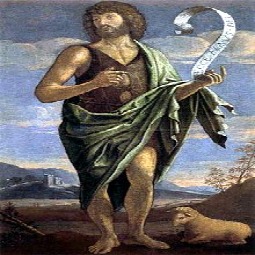What Would John the Baptist Say to America?
User's Guide to Sunday, Dec. 8.

Sunday, Dec. 8, is the Second Sunday of Advent (Year A, Cycle II).
On Monday, Dec. 9, the Church celebrates the Solemnity of the Immaculate Conception of the Blessed Virgin Mary, transferred from Sunday. This means it is not a holy day of obligation, even though it is the patronal feast day of the United States of America.
Feast Days
This week the Church celebrates two important feasts: Our Lady of Guadalupe on Dec. 12 and St. Lucy on Dec. 13.
Readings
Isaiah 11:1-10; Psalm 72:1-2, 7-8, 12-13, 17; Romans 15:4-9; Matthew 3:1-12
Our Take
What would John the Baptist say if he were alive in modern-day America instead of ancient Judea?
His message then was clear: "Repent, for the Kingdom of heaven is at hand!"
In ancient Judea, John saw Pharisees and Sadducees and took them to task. Who are today’s Pharisees and Sadducees? Looked at one way, the Pharisees are like the strict "religious" people today, and the Sadducees are like the lax religious people of our day.
The Pharisees believed that they could behave in such a way that God would automatically embrace them and give them a reward in the hereafter. Many people today are like that. Theologians call it "Pelagianism," but retreat masters might call it "Good Guy-ism." People live as "good guys." Such goodness often entails real sacrifice and suffering, with the belief that heaven will smile upon their goodness and automatically reward it one day.
The Sadducees, on the other hand, believed that this life was all there was and that it was best to live for now. Many people today believe that the hereafter is a question mark at best, and so live to satisfy themselves in this life — with a "he who dies with the most toys wins" attitude balanced by keeping up a certain level of ethical behavior.
What did John the Baptist tell the Pharisees and Sadducees, the "good guys" of his time? He called them snakes and told them to repent. Specifically, he asked for "good fruits of repentance" — a real change in their lives.
We can imagine John the Baptist taking our culture of sin to task in the same way, running down all of the seven deadly sins, telling our society to repent, too.
But he would not just lash out at sin.
He would give the great encouragement he gave to the people of his time: the promise of a changing encounter with the One who "baptizes with fire."
At our baptism and confirmation, God "baptized us with the Holy Spirit and fire." And we must live as changed people with the gifts of the Holy Spirit, as discussed in the first reading.
Ultimately, John the Baptist would tell us about Christ and the Holy Spirit. And that has always been enough.
Tom and April Hoopes write from Atchison, Kansas,
where Tom is writer in residence at Benedictine College.
- Keywords:
- Dec. 1-14, 2013
















